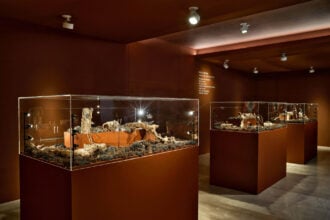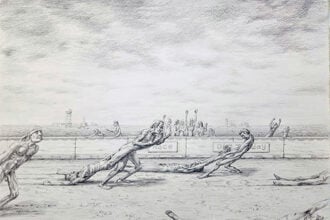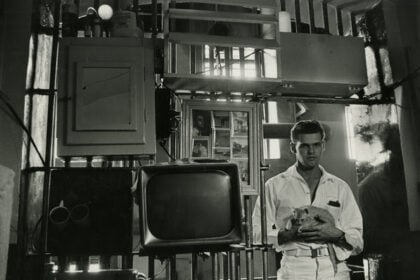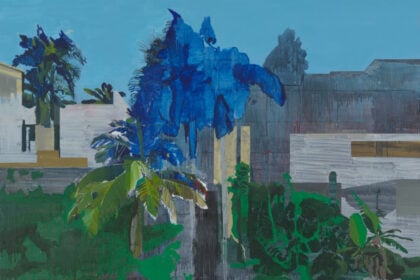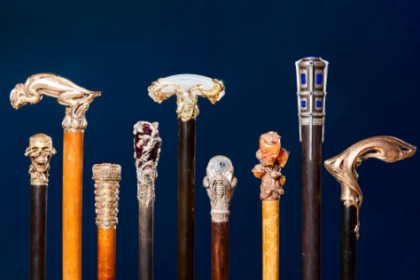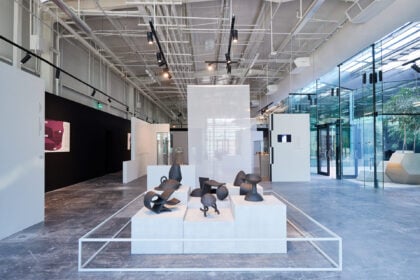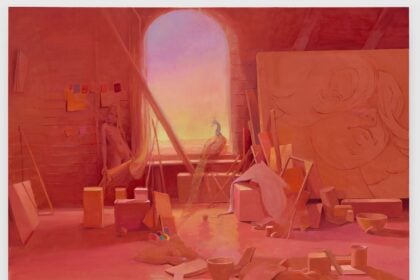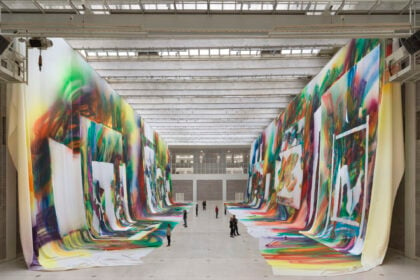WASHINGTON, DC—The Phillips Collection presents never before seen drawings by Spanish artist Bernardí Roig (b. 1965) who, while confined to his home in Binissalem, Mallorca, Spain during the global COVID-19 pandemic, created 55 drawings, one a day, inspired by the lost, severed head of Francisco José de Goya (1746–1828). They were drawn as Roig struggled to process the uncertainty of living in a world where people were physically isolated—cut off from the social body—and dying. Bernardí Roig: The Head of Goyais on view through July 7, 2024, in the museum’s Second Floor, Annex Galleries.
Goya was the most important Spanish artist of his time, painting lavish portraits of Spanish nobility and harrowing scenes of the country’s ongoing social and political turmoil. Goya’s body was discovered headless, in 1888, when it was exhumed in Bordeaux, in preparation for reinterment in Madrid. Roig’s intense and expressive drawings are meditations on the grotesque and unexplained dismemberment of Goya’s body.
“Roig’s deeply personal enterprise connects us to the past by inviting viewers to explore and find comfort in universally relatable expressive impulses,” writes Vradenburg Director & CEO Jonathan P. Binstock in the catalogue.“For those artists, including Roig, who find their rightful home within Duncan Phillips’s collection—a testament to the founder’s earnest appraisal of the value of the artist’s hand and the marks it makes— the past is alive, it is present, it is to be wrestled with and lived in.”
While living in isolation during the lockdown, Roig reflected on the legacy of artists in troubled times, and specifically those artists whose humanistic depiction of pain and suffering spoke to the present moments. Among them was the haunting example of Goya. With an obsessive fervor, Roig drew Goya’s missing head for 55 consecutive days, his mind spinning with the possibilities of where it had gone and why.
“Artworks uphold the presentness of whoever is looking at them,” says Roig. “The gaze is not innocent; it’s made of memories, and it holds millions of gazes within. During the pandemic, we had a way of feeling fear that was new to us, and now we have new scars. They aren’t better or worse than the scars of earlier eras, but they are ours.”
In this special installation, guests will be immersed in The Head of Goya drawings as they fill a gallery, arranged like a frieze to echo their diaristic feel and to document the progression of Roig’s artistic thought process. The gallery will also include The Phillips Collection’s The Repentant Saint Peter (c. 1820–24) by Goya to invite a conversation between these artists across time. The Phillips previously presented examples of Roig’s sculpture in his 2014/15 Intersections project, NO/Escape. This series is the fourth work by Roig to enter the collection.
ABOUT BERNARDÍ ROIG
Bernardí Roig was born in 1965 in Palma de Mallorca, and currently lives and works in Madrid and Binissalem, Mallorca. His multi-disciplinary work (sculpture, video, graphic, painting, and writings), with elements of minimalist and conceptual art, are subtle reflections on isolation, lack of communication, and desire. His obsessive and disturbing creations can be understood as embodiments of loneliness, expressing the urge to “speak despite the impossibility of speech” and to find figures and images for an age of uncertainty.
CATALOGUE
The exhibition is accompanied by an illustrated, bilingual catalogue by The Phillips Collection, with a foreword by Vradenburg Director & CEO Jonathan P. Binstock, an interview with the artist by Assistant Curator Camille Brown, and a text by the artist. The publication is available at the Museum Shop or shopphillipscollection.org.


